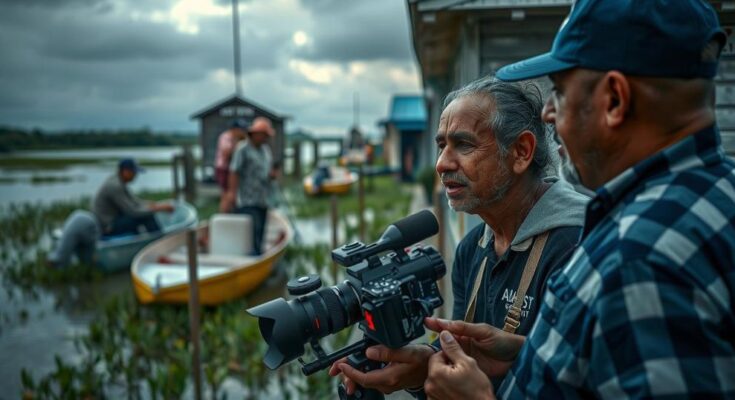Halle Parker, an environmental reporter in New Orleans, highlights the emotional and societal impact of water on local communities as they navigate the threats of climate change and rising sea levels. Her work seeks to amplify the voices of marginalized individuals affected by these changes, emphasizing the importance of storytelling in fostering understanding and advocacy.
In the coastal city of New Orleans, environmental reporter Halle Parker finds profound meaning in sharing the narratives of communities confronting the complex dualities of water. Surrounded by a landscape constantly shaped by water, New Orleanians experience a prevailing anxiety regarding the impending threats posed by storms and rising seas, impacting both their homes and daily lives. Parker articulates, “For homeowners living here, you’re constantly worried about your home getting flooded.” This anxiety is juxtaposed with water’s role as a source of recreation and sustenance—such as fishing and kayaking—which Parker recognizes as integral to the cultural fabric of the region. Halle Parker’s journey into journalism began in Virginia, where her passion for writing and social justice led her to explore the environmental repercussions of climate change on agriculture. Her subsequent shift to Louisiana revealed the pressing issues of land loss and ecological change, propelling her into the heart of environmental storytelling. Parker emphasizes that covering environmental concerns is intricately linked to social equity, especially as she identifies with marginalized communities. As she states, “Covering marginalized communities is especially important to me, partially because I am part of one of those communities.” Working with WWNO and as a co-host of the podcast “Sea Change,” Parker employs the medium of radio to showcase the voices of residents directly affected by environmental changes, conveying their emotions and challenges. She remains committed to amplifying Indigenous voices, particularly in light of the existential challenges posed by climate change, such as potential resettlement due to rising sea levels. Through her reporting, she strives to elevate those narratives that are often overlooked, stating, “When I get to elevate the voices of people on the front lines of the challenges that we’re all facing, it’s more meaningful to me.” Parker’s dedication exemplifies the pivotal role of journalism in fostering understanding and advocacy for vulnerable communities amid a changing climate.
The article focuses on the experiences of Halle Parker, an environmental reporter based in New Orleans, who emphasizes the intertwined nature of water’s benefits and threats in coastal Louisiana. It sheds light on the emotional turmoil faced by residents due to climate change, illustrating how these issues disproportionately impact marginalized communities. The context highlights the importance of storytelling as a means to convey these critical environmental challenges and the human experiences associated with them.
Halle Parker’s commitment to environmental journalism in Louisiana illustrates the significant role that storytelling plays in addressing the challenges posed by climate change. By focusing on the voices of marginalized communities, Parker not only acknowledges their struggles but also emphasizes their resilience in the face of adversity. Her work serves as a crucial reminder of the need for comprehensive narratives that inform and empower individuals facing environmental threats.
Original Source: www.waltonfamilyfoundation.org




